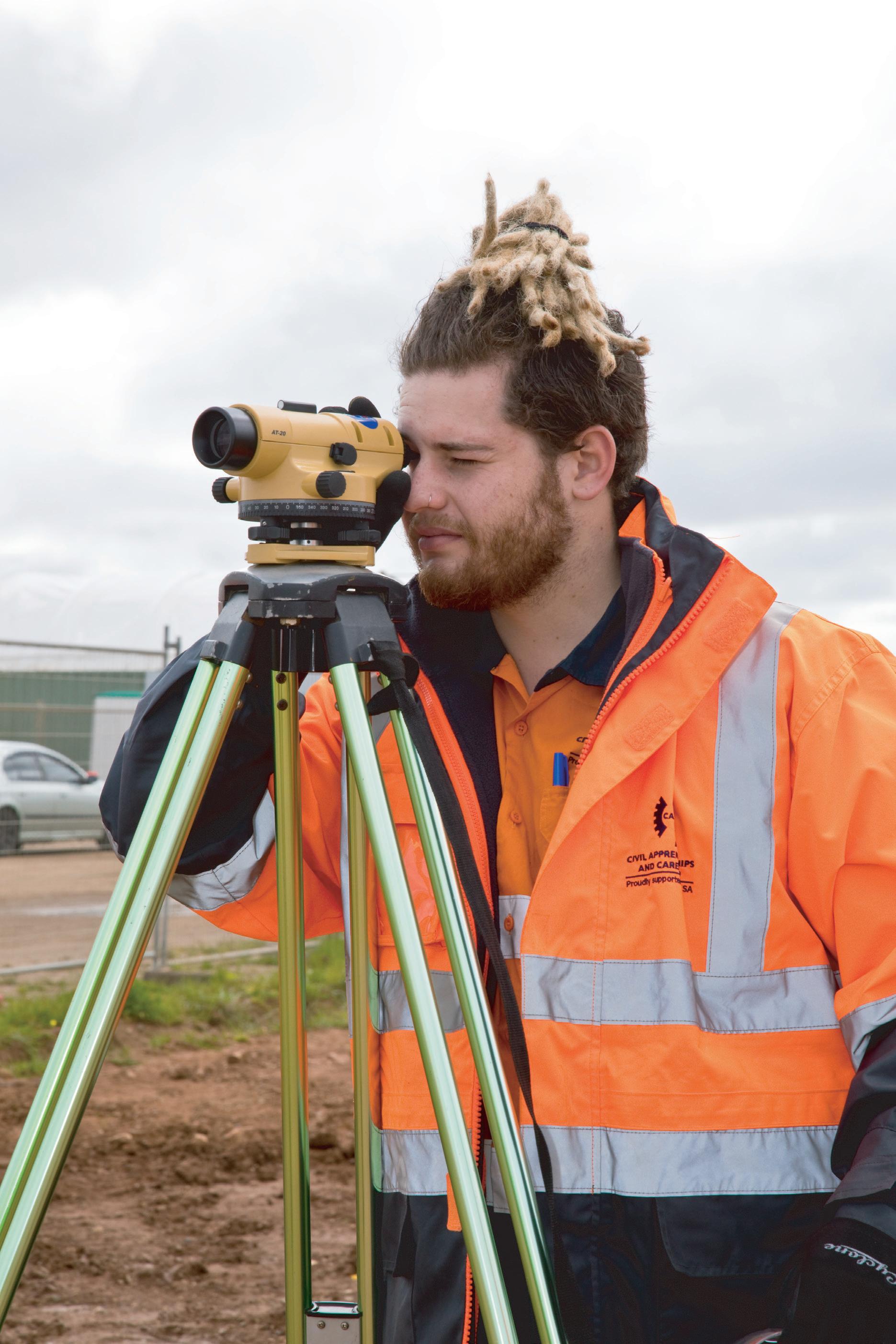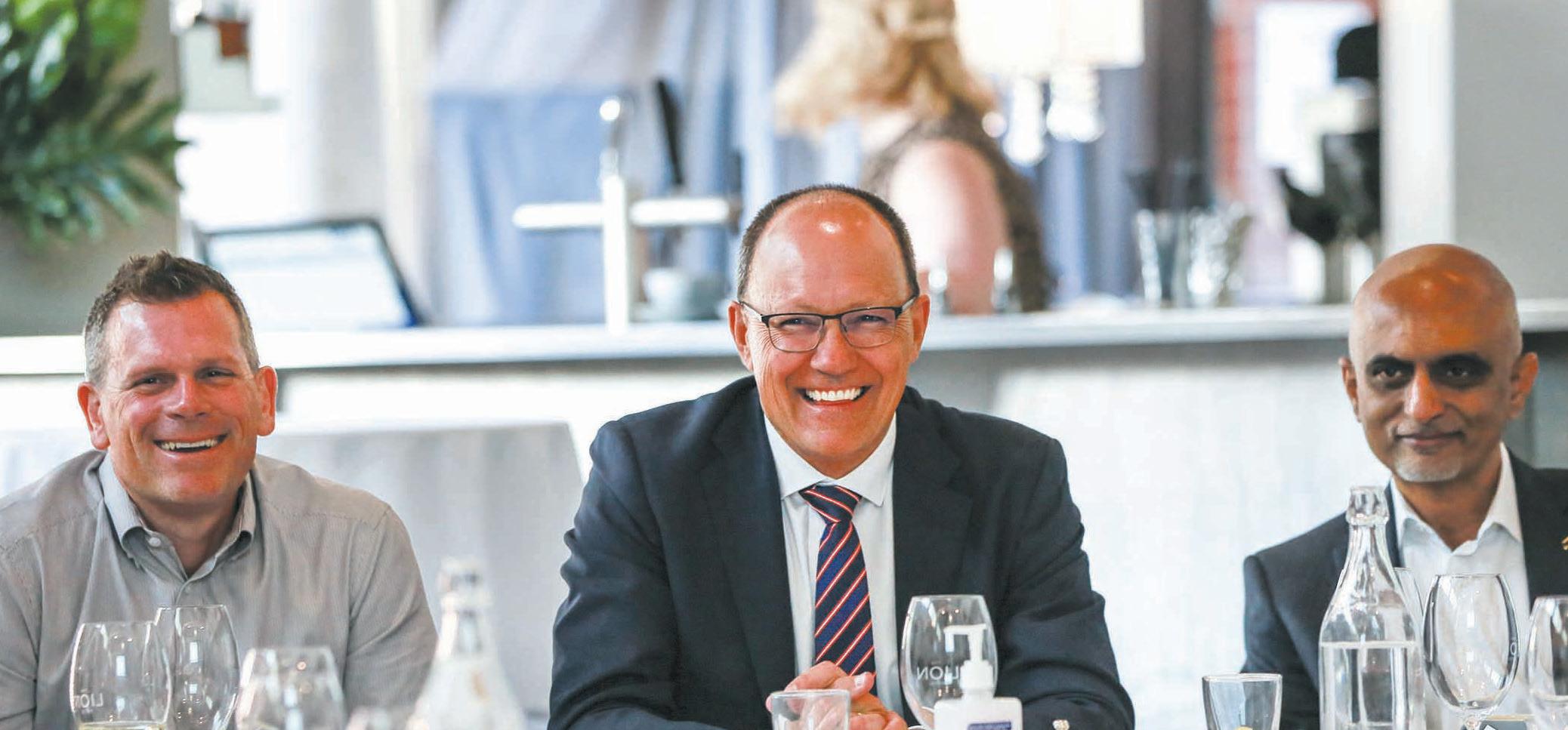
10 minute read
10 YEARS DOWN THE TRACK
WRITTEN BY MARK HOPKINS, operations manager (central and remote) – civil train nt
RTO 45621
PHASE 1
CONCEPT AND IMPLEMENTATION 2010
It all started with a basic proposition; take the latest plant simulator technology to the most remote locations in the country (operating out of Alice Springs), engage with one of the oldest cultures on earth, whilst working with and supporting industry (civil contractors) in these regions. For someone who was raised on the ocean, worked most of their life on the ocean (merchant navy/ offshore oil and gas), with a training background utilising maritime simulators, it was a challenge I could not resist (however convincing the family was a slightly longer process!).
The realities of setting up and operating in one of the harshest environments in the world, was staggering. However, the commitment to achieving the initial objectives was never lost and perseverance paid off. Logistical complexities soon became routine for the team, with trips to extremely remote indigenous communities (transporting highly technical equipment) all quite the norm! Many hundreds of indigenous people on countless remote communities in the NT, WA and SA have benefited from our presence in Central Australia. We have made a difference!
The concept of incorporating safe, user friendly, interactive technology to engage and train remote indigenous people (young and old, male and female) was and still is, challenging, exciting and rewarding for all involved. It is now the general consensus throughout the NT (Government and private sector) that this initiative has been highly successful and is now well supported.
An eighteen-month NT contract, and here we are, ten years down the track!

Trailer, ready for remote training



Setting up of the trailer for training in remote locations
PHASE 2
A PERMANENT PRESENCE
Once comfortable with the logistics of NT remote travel and training, it soon became apparent that there were numerous other opportunities in the central region, and a business case for a permanent presence quickly gained momentum. Yet again, this was fully supported by the CCF SA Board. There are always considerable risks involved in setting up any kind of business where there is (successful, well established) competition already operating, especially in a regional town like Alice Springs. But we knew we had a quality standard and level of professionalism to shake up the training market in the region, and maintaining our high standards whilst providing flexibility and value for money would prevail.
To this end, in 2012 a small office was established within the Olive Pink Botanical Gardens (a renovated bathroom). There was no local admin or regular trainers at this stage; all support came from the SA office. Working from this location enabled Civil Train to facilitate various programs on site, including numerous pre-employment, and work ready programs. Having a base at the Gardens also led to introductions with the NT Education Department, Department of Corrections, and various land/ soil management organisations, (ranger programs/ community beautification projects etc.) amongst others. All in all, our time spent at the Gardens was educational, productive, profitable and enjoyable; however, we soon outgrew the office space available, and after a visit from Phil Sutherland in 2013, it was decided to relocate to a larger stand-alone facility.
Civil Train NT continues to have close ties with the Olive Pink Botanical Gardens, and we often undertake civil works around the Gardens whilst training in plant operations on the site.

Outback footy ground

Olive Pink Botanical Gardens
PHASE 3
BECOMING A LOCAL
Anyone who has attempted to rent or lease a commercial property in Central Australia would fully appreciate the numerous issues involved, especially cost, access, and security. Fortunately, in 2014, a suitable facility did become available which enabled Civil Train NT to expand its operations with onsite confined space, working at heights and WZTM training, as well as engaging local administration support.
With the new premises came a higher profile which was soon reflected in an increase in fee for service work and private sector contracts. SA trainers were very much part of this evolution and excelled whilst working in the NT.
During this period, it became feasible to engage two NT based trainers. This further raised the profile of Civil Train by using local staff who had significant experience working in remote environments. With a permanent base and a local team, the next step was to identify ourselves as a true NT provider. In 2017, CCF SA purchased the business name ‘Civil Train NT’ giving the Territory operations its own identity and making it easier for the team to do business as a local provider.
Now an established business, Civil Train NT is an important revenue stream for the CCF SA, and from its central base in Alice Springs it enables us to have the manoeuvrability to assist remote Members, for example in the APY lands, efficiently and cost effectively. Our team has navigated through numerous territory and federal elections, changes of Governments and departments, countless severe weather events in harsh terrain, various cultural challenges, and now a pandemic.
The performance, resilience, and character shown by the Civil Train NT staff (with the support from SA) over the years, has been exceptional.

Minister Selena Uibo (right) visiting Civil Train's NT office
PHASE 4
GO NORTH
Now with a firm presence in the Centre, once again we have outgrown our current facility and are now looking at various options in relation to a feasible, suitable relocation. There are exciting times ahead for the Alice Springs office. Watch this space!
Darwin seems the obvious next step (we currently deliver onsite training only); however, this will take a different approach and with a local team, but the groundwork has now been done in relation to industry relations and government liaison. This is definitely a growth market.
LOOKING BACK
Personally, reflecting over the last ten years, there have been many individual moments and highlights that definitely stand out.
There are none more vivid than the first time I saw the faces of some remote indigenous people when they were given a demonstration and then an opportunity to operate plant simulators. The excitement and engagement was tangible.
Many of the early remote trips are standout memories for various reasons, but none more so than the challenges of traversing sand dunes whilst towing a simulator and generator to get to the WALU camp in 2012 (an indigenous remote youth engagement initiative Ngaanyatjarra Council). This camp was located in an extremely isolated part of WA (no roads), with nearby communities listed as some of the most remote locations on the planet. There were definitely lessons learnt from this experience!
We are proud of the social good we have achieved through our presence in the NT. The training conducted over the years for the Barkly Work camp (NT Corrections Tennant Creek) sits high on our list of achievements regarding job outcomes. Our numerous pre-employment programs have seen hundreds of individuals develop the underpinning knowledge and skills required to work safely and productively in a variety of civil related sectors.
Bumping into past learners who have gone on to sustainable employment is now a common occurrence for all of our NT staff; this is by far the most rewarding part of the Job.
The first time I trained on a remote cattle station is also a memorable moment for me, and was definitely an eye opener! My experience gave me a newfound respect for these individuals, the work they undertake and the environment they work in. This sector as a whole, is striving hard to improve and maintain its overall WHS standards and Civil Train NT continues to do all it can to assist the cattle industry in this endeavour.
It was whilst working with the NT Cattleman’s Association that Civil Train was offered a contract to deliver WHS training to a number of Indonesian students in Katherine who were undertaking a six-month student transfer program working on remote cattle stations. I personally facilitated this two-week program and was asked back the following three years. I consider this period of my training career to be extremely insightful and inspirational. These students were simply amazing;
I was immeasurably impressed with their intelligence, focus and determination and I am sure all have gone on to great things. It is definitely one of the highlights of my NT experience.
I am particularly proud of the role of Civil Train NT in initiating a new and innovative VET in Schools model with the Department of Education. The Introduction into Workplace Learning Program, was aimed at high school students, with a strong focus on workplace mathematics. We used civil construction skills training and plant simulators as a means to teach relevant mathematics skills with amazing results. Our trainer, Matt Schaftenaar, did an excellent job of facilitating this program. We look forward to seeing this program grow in 2021.
Having the Hon Selena Uibo, Minister for Education and Training (now Attorney- General and Minister for Justice; Minister for Treaty and Local Decision Making; Minister for Aboriginal Affairs; Minister for Parks and Rangers), come to our office for a fifteen-minute introductory meeting (which turned into an hour-long chat), was an absolute pleasure and a highlight. The Minister is an insightful, powerful, and inspirational woman who followed up on a number of the issues I raised.
Finally, of all the unexpected situations that have arisen over the last ten years, it is hard to top the day I received a call from the United States of America, Department of Defense. Following on from our training work with the Pine Gap Joint Defence Facility, I was asked if Civil Train NT could provide training in Washington D.C. “We can provide training on the moon if you can get us there,” I replied! They must have liked my response as two weeks later we had our trainer, Ari, training in the US.
Civil Train NT had been providing training services to Pine Gap for some time, and we were confident all involved appreciated our efforts; however, when we received a letter from a Lieutenant Commander at the Pentagon congratulating Civil Train, well that took the cake! Pretty hard to top that!

Letter from Pentagon

Matt S Training Students at Yirara
CONCLUSION
Civil Train NT would like to take this opportunity to thank all CCF members, clients and training participants across the various regions we service, including the numerous indigenous organisations and communities who have embraced Civil Train and supported us throughout our journey.
The Northern Territory Government, predominantly in the Department of Industry, Tourism and Trade and the Department of Education, has been pivotal to Civil Train’s sustainability in the region. The work in the NT could not occur without the operational and corporate support of the team in Adelaide. We are truly a team despite our geographical distance.
Our appreciation goes out to the CCF SA board and outgoing CEO, Phil Sutherland, for the ongoing commitment and support over the years.
Finally, to the NT staff. Our admin support in Emily Brown and Peta Horan, and our delivery team in Matt Schaftenaar and Ari Polychronopoulos, are integral to our success. Your efforts over the years have been exceptional, the level of professionalism you have all displayed given the working environment, is remarkable. You have set the bar! Well done!
There are still many opportunities to navigate in the NT, and I look forward to bringing you further updates as we continue to grow and develop to meet the needs of industry in the Central Region and the Top End.











